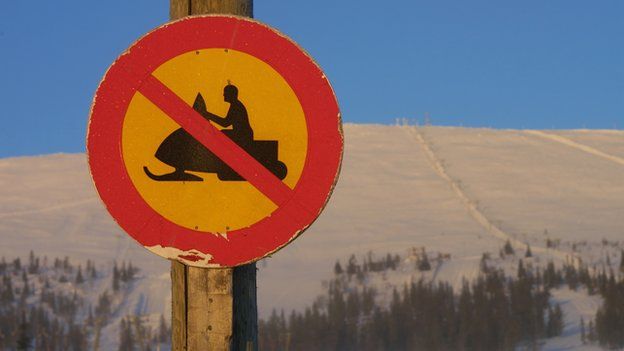Finns aren't what they used to be
- Published

No international education conference is complete without a reference to Finland.
Ever since it appeared at the top of international league tables more than a decade ago, it has been endlessly hailed as how to run an education system.
Finland, which faces a general election this week, has been the poster child for education reform and overseas delegations have made pilgrimages to learn from its example.
In particular it has been used to argue that you can have high results without an overbearing system of testing and inspection.
It was the country where pupils did not have to start school until they were seven, enjoyed the longest holidays and then basked in the glow of global approval when they topped the tables in the international Pisa tests.
But is the gloss coming off the image of Finland as an education superpower?
More like an Asian tiger
A study from Gabriel Heller Sahlgren, director of research at the Centre for Market Reform of Education, argues that Finland's education standards are in decline.
He says it is a misunderstanding of Finland's success to attribute it to a liberal culture without league tables or a formal curriculum and giving much autonomy to teachers.
In a report published by the right-wing think tank the Centre for Policy Studies, Mr Sahlgren argues that Finland's star performance in the 2000 Pisa tests was built on the legacy of an older, very traditional education system, which had been part of the country's process of nation building.
But this wasn't the image of Finland wanted by education experts, he says. Instead, when Finland was the top performer in Europe, it was used as a "counter-argument" to the success of east Asian school systems in Singapore, Shanghai and Hong Kong.
More stories from the BBC's Knowledge economy series looking at education from a global perspective and how to get in touch
While they were seen as successful because of hard work and grindingly long hours, Finland was seen as the way to achieve success with a much more creative and less centralised approach.
Mr Sahlgren, based at the London School of Economics, says there was "never any real evidence" for such an impression.
"It was simplistic, looking at how Finland's system looked today, without looking at its history."
Rather than being the opposite of east Asian countries, he says in many ways Finland was like those emerging economies.
Compared with its Nordic neighbours, Finland was a "late developer", much poorer and with lower levels of education in the early part of the 20th Century.
Finland's approach of investing heavily in education and seeing rapid improvements was in many ways more like the pattern of Tiger economies in east Asia than the more sluggish progress in western Europe.
'Fairy stories'
Mr Sahlgren's research argues there is a reluctance to accept that Finland's education system, under which many of its successful teachers had trained, had been very structured and centralised.
He quotes a research group from the UK visiting schools in Finland in 1996, a few years before the Pisa tests brought the world's attention to the country's schools.
"We have moved from school to school and seen almost identical lessons, you could have swapped the teachers over and the children would never have noticed the difference," said the researchers from the University of East Anglia, observing Finnish classrooms.
Another study challenges what it calls the "misconceptions and misrepresentations" about Finland's success in the Pisa tests.
Tim Oates, director of assessment research for the Cambridge Assessment exam group, has published a study called "Finnish fairy stories", in which he debunks what he claims are myths about the Finnish system.
'Education tourism'
He says the waves of "education tourism" that followed the success in Pisa tests failed to look at how the system had improved.
"They got off the plane and asked the Finns about the system in 2000 - not what it was like during the 1970s and 1980s, when standards were rising."
He also warns of a tendency for people to use Finland's school system as a way of confirming what they want to find.
The claim that Finland does not have an Ofsted-style inspection and national testing is an incomplete picture, says Mr Oates. He says there has been a strong system of accountability and inspection and gathering of data.
The difference from a system such as England, says Mr Oates, is how the information is used - for example in Finland exam results are not published in school league tables as they are in England.
It is also misleading to think there are not high-stakes exams or academic selection, he says, with entrance to some secondary schools being determined by test scores.
And Mr Oates argues it is "hopeless myopia" to see Finland's system as a model of high levels of autonomy.
Finland is facing another set of controversial changes, away from traditional subject teaching. And Mr Sahlgren warns of a school system in decline. It is no longer in the top 10 for maths in Pisa tests, having been in second place in 2003 and 2006.
Andreas Schleicher, the OECD's director of education and the creator of the Pisa tests, rejects this analysis.
"In the 1960s, Finland was an average performer at best and that was when it had a very traditional education system," says Mr Schleicher.
"Finland changed its system only in the late 1970s and 1980s and that's when we saw the results rise. The most recent decline is quite modest," he said.
Mr Oates says the problem has been that people have used Finland as a way of discussing their own national education debates, without really thinking about what made Finland different.
"People have been seriously misled by stories told by people who have looked at Finland through their own, restricted lens," he says.